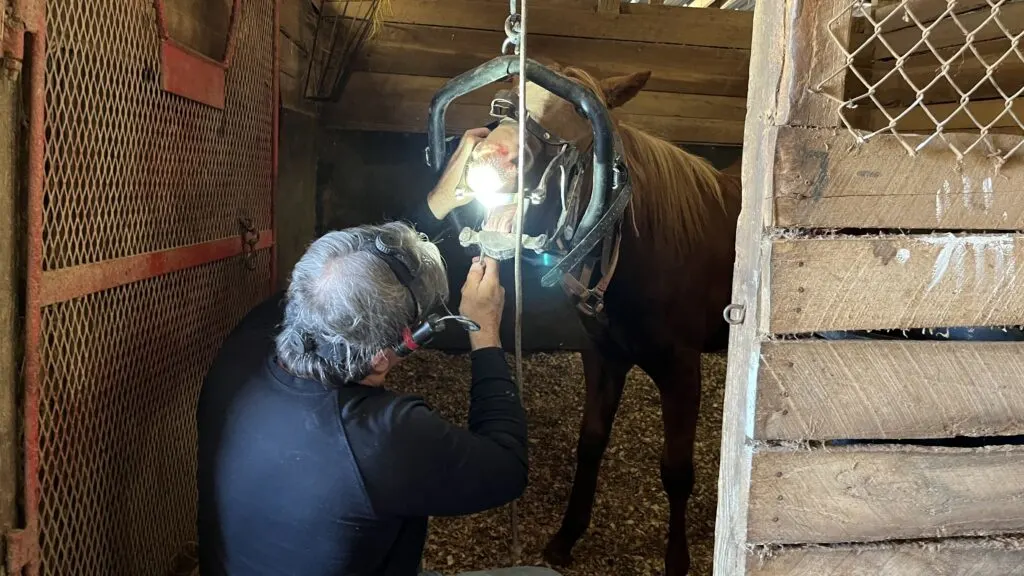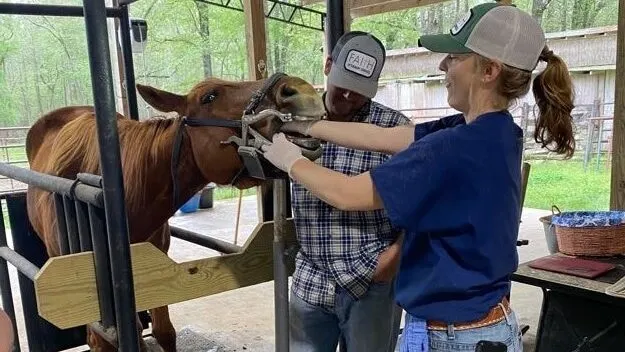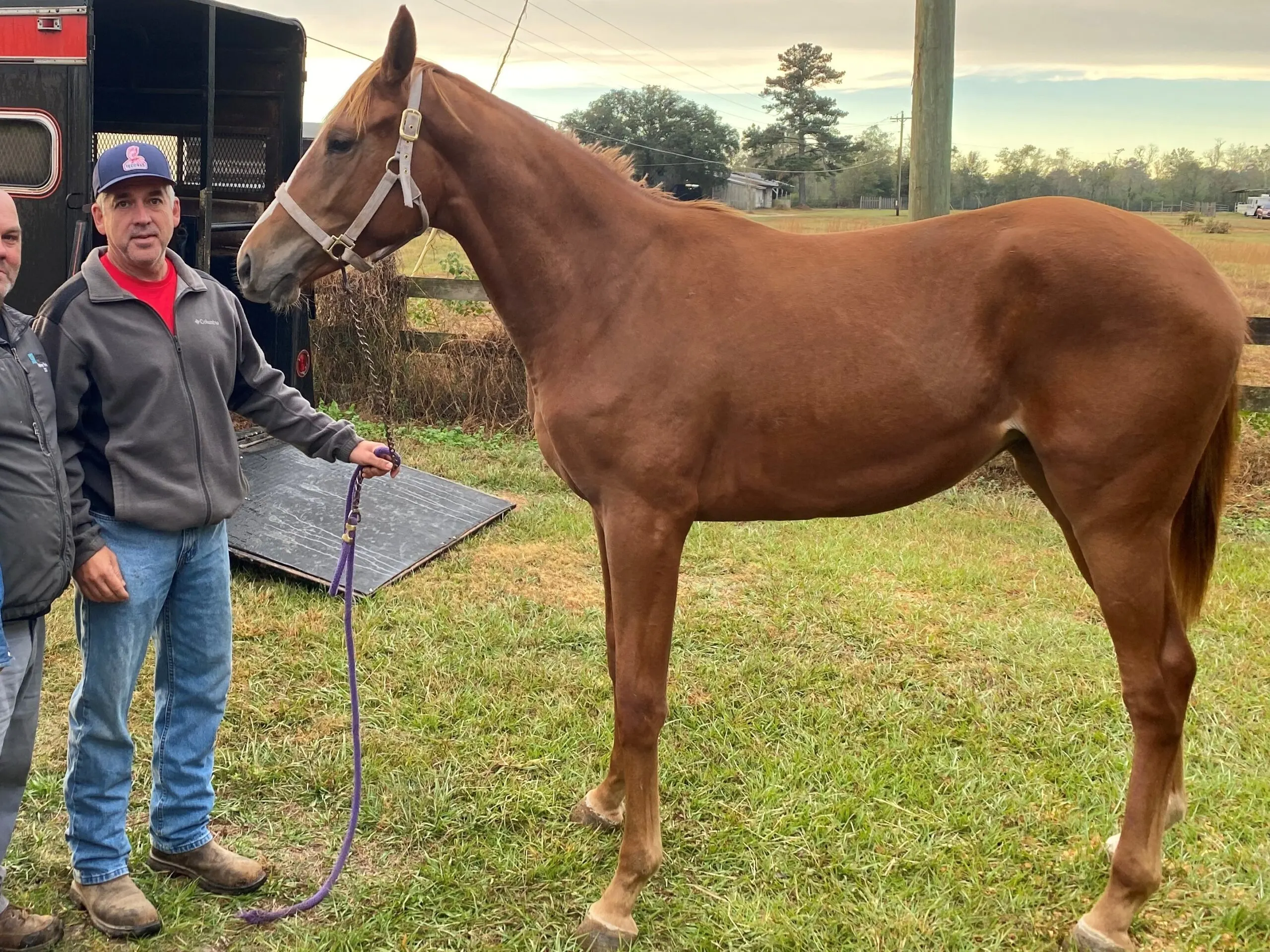Last updated: March 6, 2023
Any links on this page that lead to products on Amazon are affiliate links and I earn a commission if you make a purchase. Thanks in advance – I really appreciate it!
I recently checked the bit on my friend’s horse and noticed the animal needed its teeth floated. When I told the owner, my grandson asked how I knew the horse needed his teeth floated and how often it would need to be done.
In general, most horses need to have their teeth floated annually. However, horses are individuals and develop at different rates, so you should check your horse’s teeth every month. This horse had sores in its mouth and sharp spurs on its teeth, so it was apparent its teeth needed floating.
Horse owners are typically knowledgeable in primary horse care, such as feeding and shoeing, but floating teeth are a critical aspect of your horse’s health as well. Read on to learn more about it.
Why do horses need their teeth floated?
Horses’ mouths are designed for chewing long-fibred grasses, which they did before being domesticated. These long-fibered grasses were tough, and horses spent a lot of effort and time grinding them. The effect was that horses’ teeth naturally wore evenly.

However, domesticated horses are fed refined grains and easy-to-chew grass and hay. These softer foods require less grinding, and the teeth wear unevenly, often resulting in sharp points on the inner edges of lower molars and the outer edges of upper molars.
Horses then require regular dental treatment to file the sharp points to eliminate lacerations of the cheeks and lips and prevent further damage to the teeth, according to Belinda Palmer, an equine dentist and owner of The Bit Boutique.
If left too long, the horse may show signs such as head shaking, loss of appetite, dropping feed, and weight loss. Its breath may also be stinky. These are signs that a horse needs its teeth floated. The equine dentist will come in and rasp the teeth until they are even again, removing the source of the pain.
Here is a YouTube video of a “Duke” getting his teeth floated.
What will the dentist do when he floats my horse’s teeth?
Because some horses may react aggressively to floating, they are often given mild sedation. Sedation doesn’t put the horse to sleep but instead takes the edge off and allows the dentist to work with the animal safely. Not all horses need sedation, so this step, and for those who haven’t had problems before, it can be skipped.
The second step is to open your horses’ mouths, which can be difficult if not done right. Horses need an object inserted to hold their jaws apart during treatment. Otherwise, treating them becomes difficult because of how hard they’ll fight back once you try to rasp their teeth.
Once that is done, the dentist gently moves the horse’s tongue to the side. They may have to hold it there if the horse isn’t sedated enough to do so itself. That will prevent injury to the tongue while the examination and floating are being done.
The last two steps are the trickiest. The equine dentist uses a finger to feel around for sharp edges and uneven wear. A wedging tool is required because the dentist has to maneuver his hand inside the horse’s mouth.
If the horse were to bite down, the dentist could have a severe injury. It is also why this should never be done alone. Tools can fail. If any places are found, the dentist will then file them.
There are two choices here. It can be done manually or with an electric rasp. The latter is faster, but it may spook the horse. Many people prefer to stick to the manual method, especially when it’s the first time for the horse.
What do I do after my horse’s teeth are floated?
There are several considerations with this. Two of them are about sedation. The other is riding. It will be a while before you can ride after floatation, but it isn’t because the horse’s teeth will hurt.
However, it might be uncomfortable for a few hours after having the jaw open like that. Even mild sedation will make your horse feel a bit like they’ve had too much to drink.
It is essential to withhold feed until the horse is aware enough to remember to chew properly. As mentioned, not chewing properly can lead to other problems. That usually takes about an hour.
The other is stall rest. It will take about three hours for the sedative to wear off enough before the horse can be turned out with the rest of the herd or even alone in the paddock. It would be too easy for them to get injured while half asleep.

How often does your horse need its teeth floated?
Now, as to floating, the frequency will depend. Some horses need floating every year. Others may not need floating for several years. Like humans, horses can have good teeth, or they can have tooth problems.
Horses with other dental problems tend to need floating more frequently. They can have an overbite, an underbite, and other things. Some equine dental issues will require the dentist to visit the horse’s entire life regularly.
Equine dentist Belinda Palmer provides this insight: The rule with dentistry is always prevention is better than cure, and a horse that is treated regularly will be able to maintain its oral health and integrity of its teeth well into its 20s and live long and happy lives.
Here’s a YouTube video of a horse getting its teeth floated.
Can I float my own horse’s teeth?
Some horse owners do float their own horses’ teeth. However, those owners actually know how to do it. If you are a new horse owner, it is best to let professionals do it. They went to school and could recognize other problems the horse may have.
They are also less likely to be injured by a horse snapping its jaw shut in the middle of the procedure. While it is unlikely you will lose the finger, you may find yourself on the ground and being trampled by the horse.
Many farriers offer teeth floating services along with shoeing. Ask your farrier if he floats teeth, and if so, he can also check your horse when he visits for shoeing jobs. But if you’re interested in trying to float your horses’ teeth, Amazon sells kits for floating teeth.
If you’re interested in learning more about horse teeth, check out my article: Horse Teeth – How Many, What Kinds, & Much More!

Equine dentistry
Before we get into the frequency, there is a bit you should know about equine dentition. Horses, like humans, have baby teeth. They don’t get their complete set of forty-four permanent teeth until the age of five.
Horses are, by nature, herbivores. Some may eat meat on occasion, but it is rare. They eat grass and hay, which require a lot of chewing. If they can’t chew properly, it causes problems with digestion, which can be expensive.
A horse’s teeth grow most of its life. They usually stop growing around the age of twenty. That’s good because what they eat tends to be tough to chew. However, because we have changed how horses live, sometimes the food isn’t quite rough enough.
How often do horses need dental treatment?
Foals and yearlings typically don’t need any dental treatment unless they have a problem with their teeth. Regular dental exams generally start at around two years old.
Equine dentist Belinda Palmer recommends that your horse’s dental visits start at around two and a half years of age, or sooner if they are started under saddle, even younger.
Between the ages of two and a half and three and a half, your horse will lose twenty of its baby teeth, and adult teeth will erupt in their place.
Your horse will need to be seen frequently during this time if he is at work to avoid any new sharp edges or retained baby teeth (caps) from interfering with the bit. This can be anything from every three to every six months, depending on your horse’s level of work.
From the age of three and a half to around seven years of age, your horse’s teeth will be softer and so will wear faster and erupt faster, which means they will develop sharp points and imbalances faster than the older horse.
For this reason, they need to be seen every six months to keep their mouths healthy, balanced, and pain-free. From 7 years of age, a horse with a normal mouth that has been treated regularly can transition to annual treatments as the wear rate slows down.
As your horse reaches his later years, he is more likely to develop gum disease and diastemas (gaps between the teeth) due to the teeth becoming more fragile, the crowns shortening, and periodontal ligaments loosening.

We recommend that from around eighteen onwards, the horse returns to a six-monthly routine to catch any problems early and ensure they can eat comfortably, as older horses will lose condition faster.
For this reason, they need to be seen every six months to keep their mouths healthy, balanced, and pain-free. From 7 years of age, a horse with a normal mouth that has been treated regularly can transition to annual treatments as the wear rate slows down.
The rule with dentistry is always prevention is better than cure, and a horse that is treated regularly will be able to maintain its oral health and integrity of its teeth well into its 20s and live long and happy lives.
Your horse’s health should always come first – that means you’ll have peace of mind about his dental upkeep even after riding season has ended!
FAQ
How much does it cost to get a horse’s teeth floated?
The average cost for floating a horse’s teeth varies, but in our area, it ranges from $150-200, which includes the dentist fee, anesthesia fees, and treatment supplies. Call around vets and farriers to check prices in your region.
Do wild horses need their teeth floated?
Wild horses don’t need to go through the process of tooth floating because their diet consists solely of grass, and they are not given grain. There is a significant difference in how domesticated horses chew grains compared with eating only natural foliage, such as plants in the wild.
Meet Miles Henry
An avid equestrian and seasoned racehorse owner, Miles Henry brings his extensive experience to the equine world, proudly associating with the AQHA, The Jockey Club, and various other equine organizations. Beyond the racetrack, Miles is an accomplished author, having published various books about horses, and is a recognized authority in the field, with his work cited in multiple publications.
🔗 Connect with Miles:
Twitter
Facebook
YouTube: Check out race highlights, horse care tips, and more!

